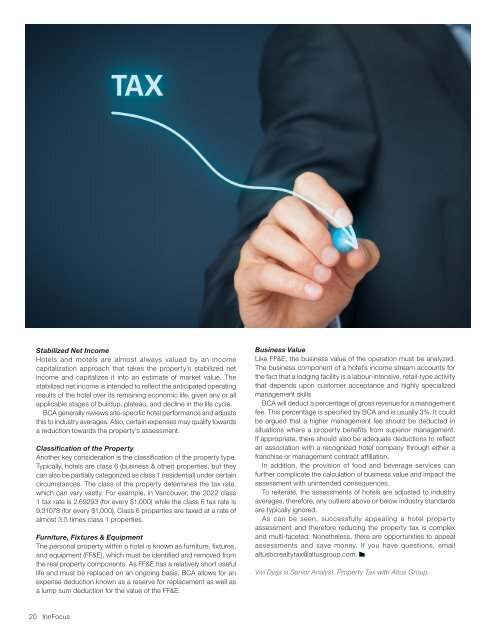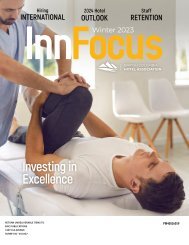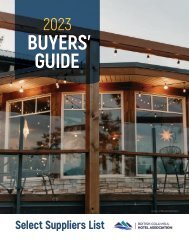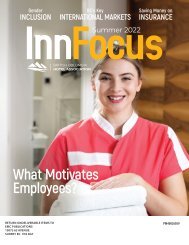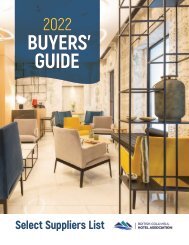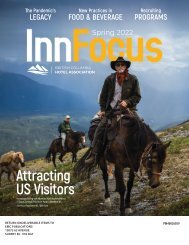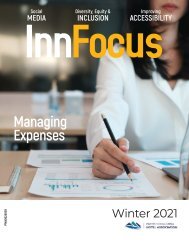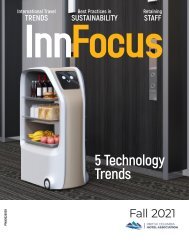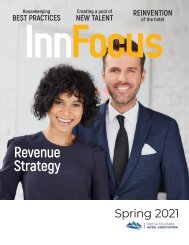InnFocus Winter 2022
InnFocus magazine for hoteliers in British Columbia
InnFocus magazine for hoteliers in British Columbia
You also want an ePaper? Increase the reach of your titles
YUMPU automatically turns print PDFs into web optimized ePapers that Google loves.
Stabilized Net Income<br />
Hotels and motels are almost always valued by an income<br />
capitalization approach that takes the property’s stabilized net<br />
income and capitalizes it into an estimate of market value. The<br />
stabilized net income is intended to reflect the anticipated operating<br />
results of the hotel over its remaining economic life, given any or all<br />
applicable stages of buildup, plateau, and decline in the life cycle.<br />
BCA generally reviews site-specific hotel performance and adjusts<br />
this to industry averages. Also, certain expenses may qualify towards<br />
a reduction towards the property’s assessment.<br />
Classification of the Property<br />
Another key consideration is the classification of the property type.<br />
Typically, hotels are class 6 (business & other) properties, but they<br />
can also be partially categorized as class 1 (residential) under certain<br />
circumstances. The class of the property determines the tax rate,<br />
which can vary vastly. For example, in Vancouver, the <strong>2022</strong> class<br />
1 tax rate is 2.69293 (for every $1,000) while the class 6 tax rate is<br />
9.31078 (for every $1,000). Class 6 properties are taxed at a rate of<br />
almost 3.5 times class 1 properties.<br />
Furniture, Fixtures & Equipment<br />
The personal property within a hotel is known as furniture, fixtures,<br />
and equipment (FF&E), which must be identified and removed from<br />
the real property components. As FF&E has a relatively short useful<br />
life and must be replaced on an ongoing basis, BCA allows for an<br />
expense deduction known as a reserve for replacement as well as<br />
a lump sum deduction for the value of the FF&E.<br />
Business Value<br />
Like FF&E, the business value of the operation must be analyzed.<br />
The business component of a hotel’s income stream accounts for<br />
the fact that a lodging facility is a labour-intensive, retail-type activity<br />
that depends upon customer acceptance and highly specialized<br />
management skills<br />
BCA will deduct a percentage of gross revenue for a management<br />
fee. This percentage is specified by BCA and is usually 3%. It could<br />
be argued that a higher management fee should be deducted in<br />
situations where a property benefits from superior management.<br />
If appropriate, there should also be adequate deductions to reflect<br />
an association with a recognized hotel company through either a<br />
franchise or management contract affiliation.<br />
In addition, the provision of food and beverage services can<br />
further complicate the calculation of business value and impact the<br />
assessment with unintended consequences.<br />
To reiterate, the assessments of hotels are adjusted to industry<br />
averages, therefore, any outliers above or below industry standards<br />
are typically ignored.<br />
As can be seen, successfully appealing a hotel property<br />
assessment and therefore reducing the property tax is complex<br />
and multi-faceted. Nonetheless, there are opportunities to appeal<br />
assessments and save money. If you have questions, email<br />
altusbcrealtytax@altusgroup.com.<br />
Vivi Djaja is Senior Analyst, Property Tax with Altus Group.<br />
20 <strong>InnFocus</strong>


